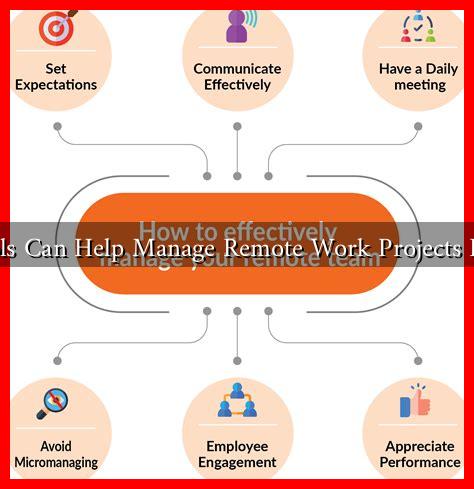-
Table of Contents
- What Tools Can Help Manage Remote Work Projects Effectively
- Communication Tools: The Backbone of Remote Collaboration
- Project Management Tools: Keeping Teams on Track
- Time Management Tools: Maximizing Productivity
- Collaboration Tools: Fostering Teamwork
- Conclusion: Choosing the Right Tools for Your Team
What Tools Can Help Manage Remote Work Projects Effectively
As remote work becomes increasingly prevalent, organizations are seeking effective tools to manage projects and teams from a distance. The right tools can enhance communication, streamline workflows, and boost productivity. In this article, we will explore various tools that can help manage remote work projects effectively, providing insights into their features, benefits, and real-world applications.
Communication Tools: The Backbone of Remote Collaboration
Effective communication is crucial for remote teams. Without face-to-face interactions, teams must rely on digital communication tools to stay connected. Here are some popular options:
- Slack: A messaging platform that allows for real-time communication through channels, direct messages, and file sharing. Slack integrates with numerous other tools, making it a versatile choice for teams.
- Microsoft Teams: This tool combines chat, video conferencing, and file collaboration in one platform. It is particularly beneficial for organizations already using Microsoft 365.
- Zoom: Known for its video conferencing capabilities, Zoom is essential for virtual meetings, webinars, and team check-ins.
According to a survey by Buffer, 20% of remote workers cite communication as their biggest struggle. Utilizing the right communication tools can significantly alleviate this issue.
Project Management Tools: Keeping Teams on Track
Project management tools help teams plan, execute, and monitor projects efficiently. Here are some of the most effective tools available:
- Trello: A visual project management tool that uses boards, lists, and cards to organize tasks. Trello is user-friendly and ideal for teams that prefer a visual approach to project management.
- Asana: This tool allows teams to create tasks, set deadlines, and track progress. Asana’s timeline feature helps visualize project schedules, making it easier to manage deadlines.
- Monday.com: A highly customizable platform that offers various templates for different project types. It provides a clear overview of project status and team workloads.
According to a report by the Project Management Institute, organizations that invest in project management tools see a 20% increase in project success rates. This statistic underscores the importance of choosing the right project management software.
Time Management Tools: Maximizing Productivity
Time management is essential for remote workers who may struggle with distractions at home. Here are some tools that can help:
- Toggl: A time-tracking tool that allows users to log hours spent on various tasks. Toggl provides insights into productivity patterns, helping teams identify areas for improvement.
- RescueTime: This tool runs in the background and tracks how time is spent on applications and websites. It provides detailed reports, helping users understand their productivity habits.
- Focus@Will: A unique tool that combines music and neuroscience to enhance focus and productivity. It offers playlists designed to help users concentrate while working.
Research from the American Psychological Association indicates that effective time management can lead to reduced stress and increased job satisfaction, making these tools invaluable for remote workers.
Collaboration Tools: Fostering Teamwork
Collaboration tools are essential for remote teams to work together effectively. Here are some noteworthy options:
- Google Workspace: A suite of cloud-based tools including Google Docs, Sheets, and Drive that allows for real-time collaboration on documents and projects.
- Notion: A versatile tool that combines note-taking, task management, and database features. Notion is great for creating shared knowledge bases and project documentation.
- Miro: An online whiteboard platform that enables teams to brainstorm, plan, and collaborate visually. Miro is particularly useful for creative teams and workshops.
According to a study by McKinsey, productivity improves by 20-25% in organizations with connected employees. Collaboration tools play a significant role in fostering this connectivity.
Conclusion: Choosing the Right Tools for Your Team
Managing remote work projects effectively requires a combination of communication, project management, time management, and collaboration tools. By leveraging these tools, organizations can enhance productivity, streamline workflows, and foster a sense of teamwork, even from a distance. As remote work continues to evolve, investing in the right tools will be crucial for success.
In summary, consider the following key takeaways:
- Effective communication tools like Slack and Microsoft Teams are essential for remote collaboration.
- Project management tools such as Trello and Asana help keep teams organized and on track.
- Time management tools like Toggl and RescueTime can enhance productivity and reduce stress.
- Collaboration tools such as Google Workspace and Notion foster teamwork and knowledge sharing.
By carefully selecting and implementing these tools, organizations can navigate the challenges of remote work and achieve their project goals efficiently.
For more insights on remote work tools, visit Forbes.

